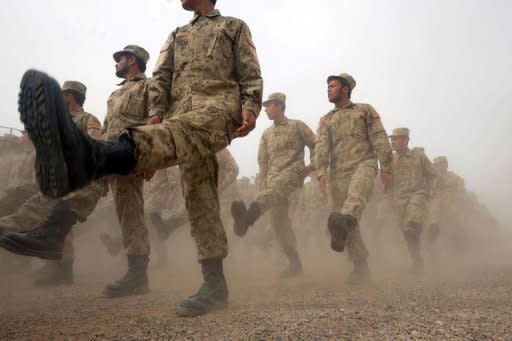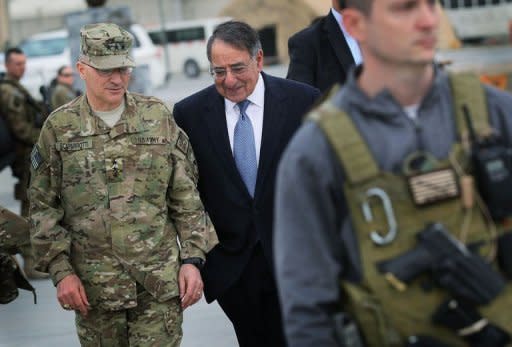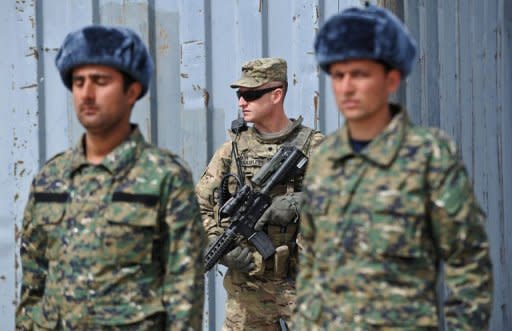Taliban break contacts, Karzai orders US out of villages
The Taliban broke off contacts over peace talks with Washington on Thursday and the Afghan president demanded US troops leave village outposts, just days after an American soldier massacred 16 villagers. Hamid Karzai also called for a transition of the nation's security from NATO control to the Afghan government in 2013 rather than the previous deadline of 2014, after meeting visiting US Defence Secretary Leon Panetta. That plan had been floated by Panetta ahead of a NATO meeting in Brussels last month, but the US-led coalition insists that it will only withdraw its combat troops by the end of 2014. The announcements from the Islamist militia fighting US troops for 10 years and by Karzai, Washington's key ally in Kabul, came hard on the heels of the shooting spree by a US soldier, who has been detained and flown out of the country. The fallout overshadowed Panetta's two-day visit to Afghanistan, which was planned ahead of the shooting and aimed at calming relations already hurt by last month's burning of Korans at a US base. The Taliban made no mention of the killings as it announced the suspension of contacts with US officials in Qatar over a prisoner swap -- talks that had built up hopes of a political solution before US troops leave. "It was due to their alternating and ever-changing position that the Islamic Emirate was compelled to suspend all dialogue with the Americans," the Taliban said on their website. But the White House denied it had changed the terms of the reconciliation dialogue. "The terms have been as I've stated them on many occasions," said White House spokesman Jay Carney, citing a need for the Taliban to lay down its arms, renounce Al-Qaeda and to abide by the Afghan constitution. "We broadly support a process here that is essential to the long-term resolution to the conflict in Afghanistan," he said. Earlier, Karzai's spokesman Aimal Faizi quoted the president as telling Panetta: "We're ready to take over all security responsibilities now," adding: "We'd prefer that the process be completed in 2013, not 2014." Karzai then told Panetta that US-led international forces should "be withdrawn from villages and relocated in their bases", his office said in a statement, without specifying a timeline. US defence officials sought to play down Karzai's calls on the outposts and said Kabul had not requested any change in an agreed timetable for a gradual troop drawdown. A US official accompanying Panetta, who arrived in Abu Dhabi after his visit to Afghanistan, told reporters on condition of anonymity that Kabul had agreed with NATO on a schedule for security transition through 2014 and that had not changed. Panetta's spokesman George Little said the Pentagon chief and Karzai had a "very positive" meeting and that the "issue of villages" came up but in accordance with previously agreed plans. NATO meanwhile vowed to stick to its plan to finish handing Afghans control of security nationwide by the end of 2014. Panetta told reporters after his Karzai talks that he was "confident" both sides could work out a treaty allowing a US military presence in the country beyond 2014. The defence chief said he was optimistic that both sides would reach an agreement on controversial night raids -- a major issue blocking the treaty -- ahead of a NATO summit in Chicago in May. Karzai objects to the raids on the grounds that they violate the sanctity of Afghan families in their own homes and that they are responsible for many civilian deaths -- a claim the US disputes. The treaty being negotiated is expected to cover Afghan-US relations beyond 2014, with the US keen to maintain a foothold in a country neighbouring Iran and to help prevent it from once again becoming a haven for Al-Qaeda. Analysts fear Sunday's shootings could complicate talks on a possible long-term US troop presence, as the government has so far refused to grant them legal immunity -- the same issue that scuppered a US strategic pact with Iraq. Panetta said he promised Karzai that the gunman would be brought to justice and that the Pentagon would look at what circumstances may have caused the incident -- including the possible effect of combat stress. But his visit was also overshadowed by an unprecedented security breach during his arrival in Afghanistan Wednesday when an Afghan interpreter tried to ram a truck into US Marines waiting to greet the Pentagon chief at Camp Bastion. Panetta downplayed the attack but the incident is likely to heighten concerns about a surge in attacks on Western troops carried out by the Afghan allies they are training to take over responsibility for security.





